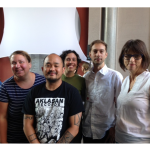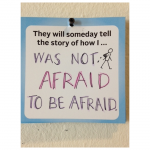I was fortunate enough to attend my second Museum Camp this past August hosted by the Santa Cruz Museum of Art and History. This summer’s focus was on SPACE—as in making space—and challenged campers to consider how we make space for ourselves and for others. Spaces are strongly tied to empowerment and forming new partnerships, and creating safer spaces to allow us to feel the fear and courage necessary for us to grow as individuals and organizations. As such, thinking about space is essential for the museum community.
- Team 15 – Movement: Ericka Chemko, Rupert Estanislao, Maesie Speer, Marty Spellerberg, Kristin Kazamaki.
The team task this year was to come up with a number of activities around making space, divided into sub-themes of stillness, creativity, courage, activist, relational, movement, ritual and environmental. My team was awarded the ‘movement’ theme, so over the following three days we developed 10 activities around creating movement in space. We refined the concepts, whittled 10 potential activities down to 3-4 more developed ideas, and gathered with other ‘movement’ teams to select seven final activities that would make up part of a space deck. The space deck is a set of cards that can be used by those in cultural sectors to help them understand, appreciate and create space for themselves and within their institution.
In addition to our own work, we heard from people who had dealt with many types of change, attended a diverse range of workshops, and visited spaces within the museum that challenged us to reflect in certain ways, such as through writing, screaming, talking with another, lying down, and various types of movement.
Throughout the experience I learned many things around the challenges people face to create space for themselves and others. Some of the most relevant to me and the work I’ve done at the Edmonton Heritage Council are:
- In many communities, there is a conflict between personal versus community responsibility. One may want to create some time for themselves rather than take on that major project that will help their community. And if they do this, they may unfortunately be deemed selfish and lazy.
- There will ALWAYS be work to do—this is a fact of life. As such, it’s important set realistic expectations and healthy boundaries between work and home to achieve a balance.
- Step up / Step back: we were challenged to contribute to spaces in different ways, such as intentionally stepping back and being quieter than normal if we tend to be over represented in conversations, or stepping up if we are normally more shy, or letting others lead the discussion and agenda.
- Each and every person has their own experience and own path that creates a unique space for them in the world. We need to respect and honour the value of everyone’s space rather than creating single or master narratives.
- The importance of ‘cultivating the edge’ (an ecological term). In ecology terms, ‘zone 1’ is the closest ecozone to you. In human terms, zone 1 is made up of those you keep closest to you. The next zone (i.e. 2 or 3) is one that is very different from you. However, in between those two zones (familiar and unfamiliar) there is always an ‘edge’ zone (an ecotone). This is a place where divergent ecozones meet and interact. It is a place of great experimentation and vibrancy as there is no one set way it is supposed to settle as. It’s important to cultivate those edge zones, whether it’s a physical space (such as the sidewalk between our institution and the street) or somewhere immaterial (like the space between those we always serve and those we would like to but don’t know anything about).
- It was recommended that as individuals we should reject or undervalue busyness in our society and take a long break from your busy life—even if only a full weekend, but perhaps even a longer trip or new way of living we’ve been dreaming about.
I encourage all of you reading this to pause and consider all the ways you create space around you personally, at work and out in the world. How might you find the courage to lean into fears of trying to create new sorts of spaces?
- Not Afraid to be Afraid. © Beck Tench
Resources:
- Santa Cruz Museum of Art and History – http://www.santacruzmah.org/
- MuseumCamp 2015 – http://camp.santacruzmah.org/.
- A downloadable version of the Space Deck (a series of cards that encourages individuals and groups to consider space) – http://thespacedeck.com/

